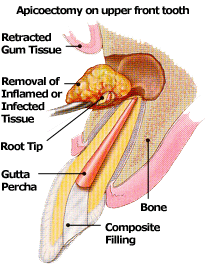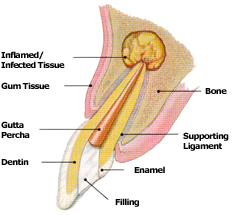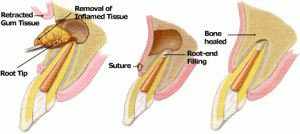
Call us to book an appointment.
Suite 235,
Mississauga,
ON L4Z 1H8

The most common endodontic procedure is called an apicoectomy or root-end resection. When inflammation or infection persists in the bony area around the end of your tooth after endodontic treatment, your endodontist may perform an apicoectomy. In this procedure, the endodontist opens the gum tissue near the tooth to expose the underlying bone, and the infected tissue is removed. The very end of the root is also removed, and a small filling may be placed to seal the root canal. Local anaesthetics make the procedure comfortable, and most patients return to their normal activities the next day.

Surgical Root Canal Treatment can help save your tooth in a variety of situations.
Although there are many surgical procedures that can be performed to save a tooth, the most common is called apicoectomy or root-end resection. When inflammation or infection persists in the bony area around the end of your tooth after a root canal procedure, your endodontist may have to perform an apicoectomy.

In this procedure, the endodontist opens the gum tissue near the tooth to see the underlying bone and to remove any inflamed or infected tissue. The very end of the root is also removed.
A small filling may be placed to seal the end of the root canal. This is termed "retrofilling", and a few stitches or sutures are placed in the gum to help the tissue heal properly.
Over a period of months, the bone heals around the end of a root.

Other surgeries endodontists might perform include dividing a tooth in half, repairing an injured or damaged root, or even removing one or more roots. Your endodontist will be happy to discuss the specific type of surgery your tooth requires.
In certain cases, a procedure called intentional replantation may be performed. In this procedure, a tooth is extracted, treated with an endodontic procedure while it is out of the mouth and then placed in its socket.
These procedures are designed to help you save your tooth.
Local anesthetics make the procedure comfortable. Of course, you may feel some discomfort or experience slight swelling while the incision heals. This is normal for any surgical procedure. Your endodontist will recommend appropriate pain medication to alleviate your discomfort.
Your endodontist will give you specific postoperative instructions to follow. If you have questions after your procedure, or if you have pain that does not respond to medication, call your endodontist.
Often you can, but you should ask your endodontist before your appointment so that you can make transportation arrangements if necessary.
Most patients return to work or other routine activities the next day. Your endodontist will be happy to discuss your expected recovery time with you.
Your dentist or endodontist is suggesting endodontic surgery because he or she believes it is the best option for you. Of course, there are no guarantees with any surgical procedure. Your endodontist will discuss your chances of success for your surgical root canal treatment so that you can make an informed decision.